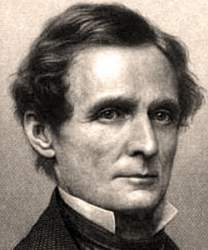Record Data
Recipient (to)
The Soldiers of the Confederate States
Type
Executive record
Date Certainty
Exact
Transcriber
John Osborne
Transcription date
Transcription
The following text is presented here in complete form, as it originally appeared in print. Spelling and typographical errors have been preserved as in the original.
To the Soldiers of the Confederate States:
After more than two years of a warfare scarcely equalled in the number, magnitude, and fearful carnage of its battles—a warfare in which your courage and fortitude have illustrated your country, and attracted not only gratitude at home, but admiration abroad—your enemies continue a struggle in which our final triumph must be inevitable. Unduly elated with their recent successes, they imagine that temporary reverses can quell your spirit or shake your determination, and they are now gathering heavy masses for a general invasion, in the vain hope that by a desperate effort success may at length be reached.
You know too well, my countrymen, what they mean by success. Their malignant rage aims at nothing less than the extermination of yourselves, your wives and children. They seek to destroy what they cannot plunder. They propose as the spoils of victory that your homes shall bo partitioned among the wretches whose atrocious cruelties have stamped infamy on their government. They design to incite servile insurrection, and light the fires of incendiarism whenever they can reach your homes, and they debauch the inferior race, hitherto docile and contented, by promising indulgence of the vilest passions as the price of treachery. Conscious of their inability to prevail by legitimate warfare, not daring to make peace lest they should be hurled from their seats of power, the men who now rule in Washington refuse even to confer on the subject of putting an end to outrages which disgrace our age, or to listen to a suggestion for conducting the war according to the usages of civilization.
Fellow-citizens, no alternative is left you but victory, or subjugation, slavery and the utter ruin of yourselves, your families and your country. The victory is within your reach. You need but stretch forth your hands to grasp it. For this and all that is necessary is that those who are called to the field by every motive that can move the human heart, should promptly repair to the post of duty, should stand by their comrades now in front of the foe, and thus so strengthen the armies of the Confederacy as to insure success. The men now absent from their posts would if present in the field suffice to create numerical equality between our force and that of the invaders—and when with any approach to such equality have we failed to be victorious? I believe that but few of those absent are actuated by unwillingness to serve their country; but that many have found it difficult to resist the temptation of a visit to their homes, and the loved ones from whom they have been so long separated; that others have left for temporary attention to their affairs, with the intention of returning, and then have shrunk from the consequences of their violation of duty; that others again have left their posts from mere restlessness and desire of change, each quieting the upbraidings of his conscience by persuading himself that his individual services could have no influence on the general result.
These and other causes (although far less disgraceful than the desire to avoid danger, or to escape from the sacrifices required by patriotism) are, nevertheless, grievous faults, and place the cause of our beloved country, and of every thing we hold dear, in imminent peril. I repeat that the men who now owe duty to their country, who have been called out and have not yet reported for duty, or who have absented themselves from their posts, are sufficient in number to secure us victory in the struggle now impending.
I call on you, then, my countrymen, to hasten to your camps, in obedience to the dictates of honor and of duty, and summon those who have absented themselves without leave, who have remained absent beyond the period allowed by their furloughs, to repair without delay to their respective commands; and I do hereby declare that I grant a general pardon and amnesty to all officers and men within the Confederacy, now absent without leave, who shall, with the least possible delay, return to their proper posts of duty, but no excuse will be received for any delay beyond twenty days after the first publication of this proclamation in the State in which the absentee may be at the date of the publication. This amnesty and pardon shall extend to all who have been accused, or who have been convicted and are undergoing sentence for absence without leave or desertion, excepting only those who have been twice convicted of desertion.
Finally, I conjure my countrywomen, the wives, mothers, sisters and daughters of the Confederacy —to use their all-powerful influence in aid of this call, to add one crowning sacrifice to those which their patriotism has so freely and constantly afforded on their country's altar, and to take care that none who owe service in the field shall be sheltered at home from the disgrace of having deserted their duty to their families, to their country, and to their God.
Given under my hand, and the Seal of the Confederate States, at Richmond, this first day of August, in the year of our Lord one thousand eight hundred and sixty-three.
Jefferson Davis.
By the President:
J. P. Benjamin,
Secretary of State.
The papers throughout the confederate States are requested to copy this proclamation at the earliest moment, and for twenty days thereafter, and send their bills to the Private Secretary of the President.


